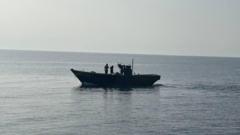South Korea has confirmed the repatriation of six North Koreans who unintentionally entered South Korean waters earlier this year. According to the Ministry of Unification, all six individuals had expressed a persistent desire to return home. Two of the North Koreans arrived in southern waters in March, remaining in the South for four months—the longest recorded period for non-defectors. The remaining four were sailors who crossed a disputed maritime boundary in May. This marks the first such return under President Lee Jae-myung, who has advocated for improved communication and relations between the two Koreas.
Historically, North Koreans who drift into South Korean waters usually do so in small, wooden boats that lack maneuverability. In previous instances, authorities from both nations coordinated repatriations through land borders when individuals expressed a wish to return. However, since North Korea severed communication channels in April 2023, it has become increasingly difficult to coordinate such efforts. Following these developments, North Korean leader Kim Jong Un declared unification with the South as unattainable.
Despite this backdrop, there were indications that the two countries might have negotiated a secret upheaval regarding the repatriation, as North Korean vessels were reportedly present at the delivery location for the six returnees. Experts suggest that these individuals will likely undergo extensive interrogation upon their return, aiming to extract potentially sensitive information about their time in the South.
Critics, including human rights activists, expressed disappointment over the repatriation, arguing that the North Koreans should have been given an opportunity to learn about life in South Korea and engage with defectors. These activists fear that returning individuals may face punitive measures from the North simply for having experienced life outside the regime. With the recent changes in leadership within South Korea, including President Lee's initiative to foster dialogue, many expect only limited advancement in relations, especially given North Korea's strengthening ties with Russia and a general public sentiment in South Korea discouraging engagement with the North.
Overall, while the repatriation reflects the ongoing complexities of inter-Korean relations, many analysts remain skeptical about any significant thaw in relations in the near future, given the entrenched positions on both sides and the external geopolitical landscape.



















